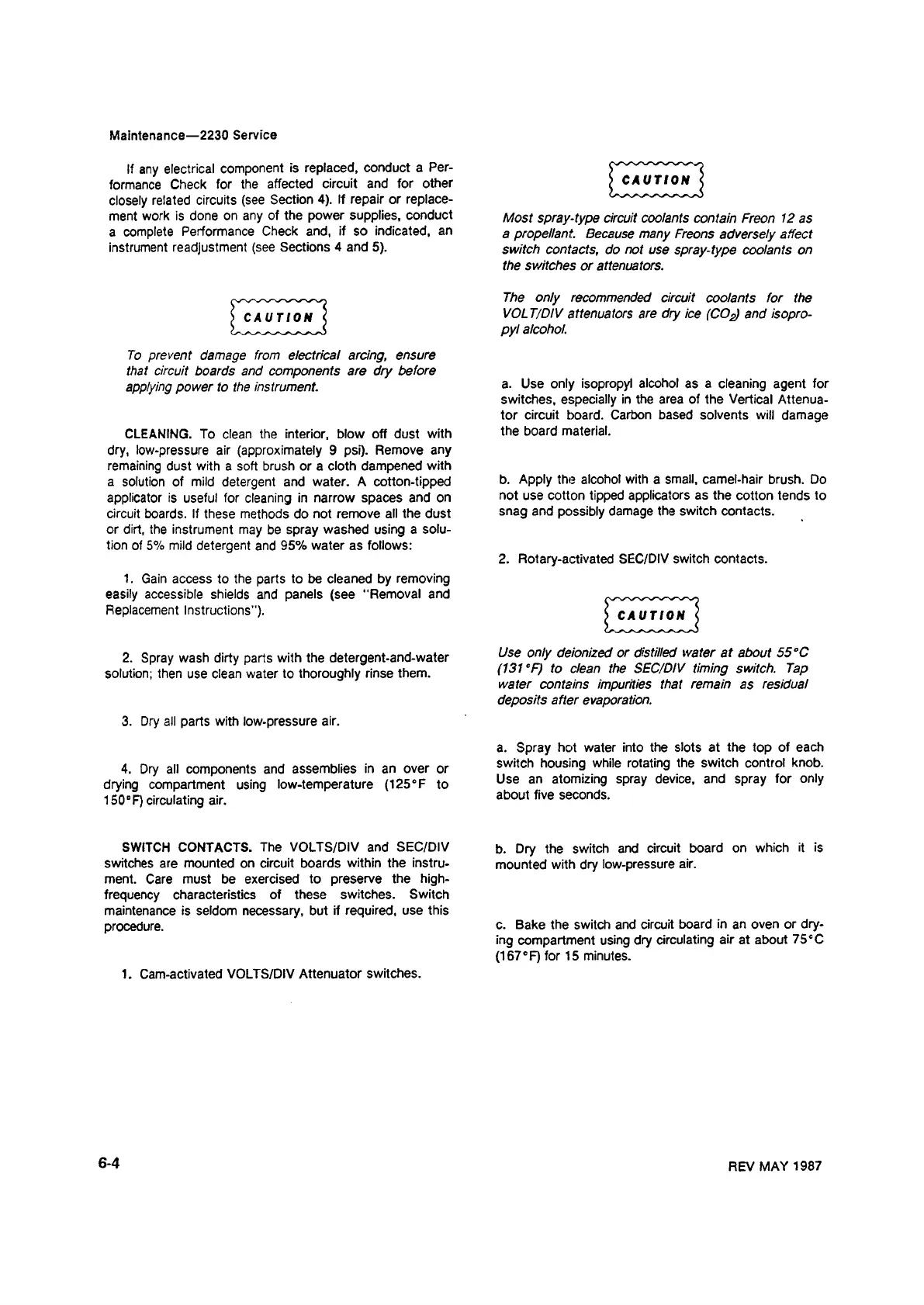Maintenance—2230 Service
If any electrical component is replaced, conduct a Per
formance Check for the affected circuit and for other
closely related circuits (see Section 4). If repair or replace
ment work is done on any of the power supplies, conduct
a complete Performance Check and, if so indicated, an
instrument readjustment (see Sections 4 and 5).
To prevent damage from electrical arcing, ensure
that circuit boards and components are dry before
applying power to the instrument.
CLEANING. To clean the interior, blow off dust with
dry, low-pressure air (approximately 9 psi). Remove any
remaining dust with a soft brush or a cloth dampened with
a solution of mild detergent and water. A cotton-tipped
applicator is useful for cleaning in narrow spaces and on
circuit boards. If these methods do not remove all the dust
or dirt, the instrument may be spray washed using a solu
tion of 5% mild detergent and 95% water as follows:
1. Gain access to the parts to be cleaned by removing
easily accessible shields and panels (see "Removal and
Replacement Instructions”).
2. Spray wash dirty parts with the detergent-and-water
solution; then use clean water to thoroughly rinse them.
3. Dry all parts with low-pressure air.
4. Dry all components and assemblies in an over or
drying compartment using low-temperature (125°F to
150 °F) circulating air.
SWITCH CONTACTS. The VOLTS/DIV and SEC/DIV
switches are mounted on circuit boards within the instru
ment. Care must be exercised to preserve the high-
frequency characteristics of these switches. Switch
maintenance is seldom necessary, but if required, use this
procedure.
1. Cam-activated VOLTS/DIV Attenuator switches.
Most spray-type circuit coolants contain Freon 12 as
a propellant. Because many Freons adversely affect
switch contacts, do not use spray-type coolants on
the switches or attenuators.
The only recommended circuit coolants for the
VOLT/DIV attenuators are dry ice (CO2) and isopro
pyl alcohol.
a. Use only isopropyl alcohol as a cleaning agent for
switches, especially in the area of the Vertical Attenua
tor circuit board. Carbon based solvents will damage
the board material.
b. Apply the alcohol with a small, camel-hair brush. Do
not use cotton tipped applicators as the cotton tends to
snag and possibly damage the switch contacts.
2. Rotary-activated SEC/DIV switch contacts.
Use only deionized or distilled water at about 55 °C
(131 eF) to clean the SEC/DIV timing switch. Tap
water contains impurities that remain as residual
deposits after evaporation.
a. Spray hot water into the slots at the top of each
switch housing while rotating the switch control knob.
Use an atomizing spray device, and spray for only
about five seconds.
b. Dry the switch and circuit board on which it is
mounted with dry low-pressure air.
c. Bake the switch and circuit board in an oven or dry
ing compartment using dry circulating air at about 75eC
(167CF) for 15 minutes.
6-4
REV MAY 1987
